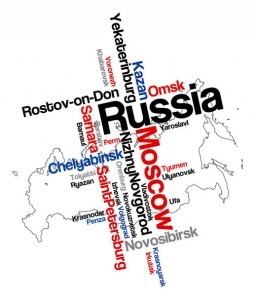[sharethis]
 A modern Russian interpreter works in much more difficult conditions nowadays.
A modern Russian interpreter works in much more difficult conditions nowadays.
The work of a Russian English interpreter is much more challenging today than it used to be! Interpreter services during the Cold War were limited to relatively few topics, such as diplomacy, international trade and disarmament.
The market for professional interpreters and translators and translation agencies was relatively small. When perestroika started, Russia was exposed to a variety of new ideas, and major changes happened in the Russian language and the Russian mindset.
Cross-cultural communication has become much more difficult and multifaceted, especially considering the fact that the status of the Russian language varies in the countries that emerged in the territory of the Former Soviet Union.
Therefore, Russian English interpreter training should include not only translation and interpretation skills per se. Learning about Russian culture, traditions, constantly updating your background knowledge of current news and events become an indispensable task not just for a conference interpreter but for a legal interpreter, for a medical interpreter, for a certified Russian interpreter.
 This is one of the more interesting challenges of the profession and students of professional interpretation must be aware of this and interpreting services providers must consider this as well.
This is one of the more interesting challenges of the profession and students of professional interpretation must be aware of this and interpreting services providers must consider this as well.
Simultaneous interpreting and consecutive interpreting are also done in a much greater variety of settings.
It is not any more just a conference room: a Russian interpreter agency may work in many locations: from a classroom to a field tour. Another issue when providing Russian English interpreter services today is that the Russian language is contaminated with words borrowed from English.
It is true for various types of Russian English interpretation: court interpreting, over-the-phone interpretation etc. Russian English interpreters certainly have to be mindful and while it is important to follow latest developments in the language, contaminating it with immigrant language or corporate slang is unacceptable.
 Another challenge is the issue of quality of translation services. Traditionally Russian English interpreter education was limited to a relatively small array of educational institutions.
Another challenge is the issue of quality of translation services. Traditionally Russian English interpreter education was limited to a relatively small array of educational institutions.
Bachelor’s degree is in our opinion usually not enough. It has to be dedicated post graduate training in conference simultaneous and consecutive interpretation.
For example, in the United States there is only one Master’s level program in professional Russian interpreting.
All top level Russian English interpreters have a professional degree in conference interpretation or years of experience, although technically speaking years of experience may not be used as a qualification for an interpreter: Russian or other language – a substandard amateur may work for years as a Russian English interpreter with poor translation services quality and low client retention rate.
Hiring standards, therefore, become extremely important and the goal is not simply to close a work order but to provide the highest level of quality of interpreter services.
To do this a relatively small pool of top notch conference interpreters has to be used especially for critical assignments.
 In our Blog we wrote already that high level Russian English interpreters travel extensively because travel expenses are negligible compared to assurance of translation services quality.
In our Blog we wrote already that high level Russian English interpreters travel extensively because travel expenses are negligible compared to assurance of translation services quality.
You can read about a variety of our Russian language services including simultaneous and consecutive interpretation on our website.
Sincerely
InterStar Translations
[sharethis]

